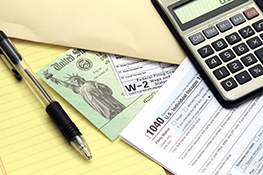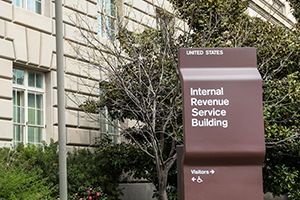 Whether you own cryptocurrency or not, everyone should know the tax rules surrounding this type of property as it becomes more popular. If you have one take away regarding cryptocurrency, it should be this: Remember that Uncle Sam is watching you!
Whether you own cryptocurrency or not, everyone should know the tax rules surrounding this type of property as it becomes more popular. If you have one take away regarding cryptocurrency, it should be this: Remember that Uncle Sam is watching you!
Here’s what you need to know about the IRS and cryptocurrency:
Background
The IRS generally considers cryptocurrency—also referred to as virtual currency or digital currency—to be property, just like stocks and bonds for federal income tax purposes.
Therefore, if you sell cryptocurrency at a gain, it is subject to capital gains tax. Similarly, you may claim a capital loss on the sale or other disposition of cryptocurrency. But that’s not all: Anytime you exchange cryptocurrency for actual currency, goods or services, the IRS says it’s a taxable event.
Say that you hold Bitcoin for longer than one year and then sell it at a gain. The gain is taxable up to 20%. High-income taxpayers may also need to pay a 3.8% surtax on the cryptocurrency gain. Accordingly, you can use a loss from a cryptocurrency sale to offset capital gains plus up to $3,000 of ordinary income. Any excess is carried over to the following tax year.
The IRS Is Watching You!
Cryptocurrency transactions often flew under the radar, but the IRS is now paying much closer attention. Here’s how the IRS is stepping up enforcement efforts:
- Answer a Form 1040 question. The IRS is so concerned about cryptocurrency transactions being reported that they have a cryptocurrency question on Page 1 of your tax return, just below your name. Before filling out any part of your tax return, the IRS wants you to answer a question about whether you received, sold, exchanged, or otherwise disposed of any financial interest in any virtual currency.
- Brokers must report transactions. After 7 years of gently prodding taxpayers to self-report cryptocurrency transactions, Congress has given the green light for the IRS to obtain cost basis and sales proceeds information for all crypto transactions directly from brokers (such as CoinBase, Electrum or Mycelium) or other individuals who regularly provide digital asset transfer services on behalf of other people. Similar to the reporting of stocks and bonds, taxpayers will receive a Form 1099-B from brokers that list all crypto transactions. These new reporting rules are effective beginning January 1, 2023.
- Expanded $10,000 reporting requirement. Businesses that accept virtual currency as payment may be required to report transactions above $10,000 to the IRS beginning January 1, 2023. In an interesting twist, cryptocurrency and other digital assets would be considered cash for purposes of the $10,000 reporting requirement, while the IRS will continue to treat cryptocurrency as real property (and not cash) for tax compliance purposes.
What you need to do
Here are some suggestions for tracking and reporting your cryptocurrency transactions on your tax return:
- Keep up-to-date records. Consider tracking each transaction as they occur throughout the year. You may also want to keep your own transaction ledger as a way to double-check the accuracy of your broker’s statements.
- Set aside money to pay taxes. Consider saving a certain percentage of each cryptocurrency transaction you sell at a gain for taxes you may need to pay.
- Be aware before you dive into cryptocurrency. As you can see, being involved in cryptocurrency may not be for everyone. Wild swings in valuation are common. Reporting requirements are complicated.
Prepare for this year’s tax return filing season
 Tax return filing season usually gets a little crazy, but this year will be more turbulent than most. Due to new tax legislation and guidance from the IRS, you will have to cope with a wide variety of tax changes, some of which relate to the pandemic. Here are several tips for making some order out of the chaos.
Tax return filing season usually gets a little crazy, but this year will be more turbulent than most. Due to new tax legislation and guidance from the IRS, you will have to cope with a wide variety of tax changes, some of which relate to the pandemic. Here are several tips for making some order out of the chaos.
Unemployment benefits
Unemployment benefits are taxable once again in 2021. In 2020, the first $10,200 of benefits received by taxpayers with an adjusted gross income (AGI) of less than $150,000 were exempt from tax. Unfortunately, the tax-free nature of unemployment benefits in 2020 was made long after many of you filed your tax return. If this pertains to you, and you haven’t received a refund from a tax overpayment yet, you might need to file an amended 2020 tax return.
Small business loans
To kick start the economy during the pandemic, Congress created a loan program called the Paycheck Protection Program (PPP). Similarly, your small business might have received an Economic Injury Disaster Loan (EIDL) or grant. These loans may be forgiven in 2021 without any adverse tax consequences if certain conditions were met. So, gather your records—including what you received and when—for optimal tax protection.
Economic impact payments
Congress handed out three rounds of Economic Impact Payments to individuals in 2020 and 2021. The third payment provided a maximum of $1,400 per person, including dependents, subject to a phaseout. For single filers, the phaseout begins at $75,000 of AGI; $150,000 for joint filers. So, review your records and be very clear what payments you received in 2021. Only then can you use your 2021 tax return to ensure you receive credit for your full stimulus payments.
Child tax credit
Many families will benefit from an enhanced Child Tax Credit (CTC) on their 2021 tax return. The new rules provide a credit of up to $3,000 per qualifying child ages 6 through 17 ($3,600 per qualifying child under age six), subject to a phaseout beginning at $75,000 of AGI for single filers and $150,000 for joint filers. What will complicate this year’s tax filing are any advance payments you received from the IRS during the second half of 2021. It is important that you accurately identify all the payments you received. Only then can correct adjustments be made on your tax return to ensure you receive the full Child Tax Credit amount.
Dependent care credit
The available dependent care credit for qualified expenses incurred in 2021 is much higher than 2020, with a corresponding increase in phaseout levels. The maximum credit for households with an AGI up to $125,000 is $4,000 for one under-age-13 child and $8,000 for two or more children. The credit is gradually reduced, then disappears completely if your AGI exceeds $440,000.
Due to the ongoing debate of proposed legislation in Washington, D.C., this year’s tax filing season will seem a bit chaotic. With proper preparation, though, your situation can be orderly…but only if you prepare!
What you need to know if one of your tax returns is stuck
 The IRS is coping with a backlog of historical proportions and it is impacting millions of taxpayers. According to IRS sources, as of July 31, there are still over 13 million tax returns that are to be processed. The nearly unprecedented delay is being attributed to the COVID-19 pandemic, under staffing at the IRS, and a slew of recent tax law changes. The challenge is how to navigate the IRS notices if you are caught up in this mess.
The IRS is coping with a backlog of historical proportions and it is impacting millions of taxpayers. According to IRS sources, as of July 31, there are still over 13 million tax returns that are to be processed. The nearly unprecedented delay is being attributed to the COVID-19 pandemic, under staffing at the IRS, and a slew of recent tax law changes. The challenge is how to navigate the IRS notices if you are caught up in this mess.
Complicating your tax life
- You’ve filed for an extension via mail, but the IRS says you haven’t filed your return yet and issues notices and penalties.
- You keep getting letters from the IRS after responding to initial inquiries.
- You filed your tax return on time, but the IRS says it doesn’t have your return, even though you may have received a confirmation.
What you can do
While you may not be able to get your tax return processed any faster, there are steps you can take to stay informed and make it easier for the IRS to work with your tax situation:
- Track your refund status. The IRS has developed an online tool, “Where’s My Refund?” that can provide updates. Find it at https://www.irs.gov/refunds.
- Check out IRS2Go. The agency also provides a mobile app called IRS2Go that checks your tax refund status. You can see if your return has been received, approved, and sent.
- Stay calm and keep responding. If the IRS sends you notices, keep detailed records of the notices and your timely replies. Eventually, they will get caught up. So keep good records by leaving a digital footprint and back up electronic records with paper versions.
- Prior correspondence is your friend. When you’re replying to IRS notifications, attach copies of prior correspondence with your latest letter. Make it easy for the IRS to follow your paper trail by dating each response and keeping the most recent response on top.
- Keep proof of delivery. Use express delivery or certified mail to confirm that the IRS receives your responses in a timely manner.
Remember that the IRS is working as quickly as it can to clear this backlog.
With identity thieves continuing to target the tax community, the IRS is urging you to learn the new signs of identity theft so you can react quickly to limit any damage.
The common signs of ID theft
Here are some of the common signs of identity theft according to the IRS:
- In early 2022, you receive a refund before filing your 2021 tax return.
- You receive a tax transcript you didn’t request from the IRS.
- A notice that someone created an IRS online account without your consent.
- You find out that more than one tax return was filed using your Social Security Number.
- You receive tax documents from an employer you do not know.
Other signs of identity theft include:
- Unexplained withdrawals on bank statements.
- Mysterious credit card charges.
- Your credit report shows accounts you didn’t open.
- You are billed for services you didn’t use or receive calls about phantom debts.
What you can do
If you discover that you’re a victim of identity theft, consider taking the following action:
- Notify creditors and banks. Most credit card companies offer protections to cardholders affected by ID theft. Generally, you can avoid liability for unauthorized charges exceeding $50. But if your ATM or debit card is stolen, report the theft immediately to avoid dire consequences.
- Place a fraud alert on your credit report. To avoid long-lasting impact, contact any one of the three major credit reporting agencies—Equifax, Experian or TransUnion—to request a fraud alert. This covers all three of your credit files.
- Report the theft to the Federal Trade Commission (FTC). Visit identitytheft.gov or call 877-438-4338. The FTC will provide a recovery plan and offer updates if you set up an account on the website.
- Contact your CPA, tax preparer or financial advisor if you suspect any tax-related identity theft. If any of the previously mentioned signs of tax-related identity theft have happened to you, please call to make an appointment to discuss what further steps you can take.
 Summertime means the 2020 tax filing season is firmly in the rearview mirror for millions of Americans. But summertime is also the season when the IRS sends letters to unlucky taxpayers demanding more money!
Summertime means the 2020 tax filing season is firmly in the rearview mirror for millions of Americans. But summertime is also the season when the IRS sends letters to unlucky taxpayers demanding more money!
If you receive a notice from the IRS, do not automatically assume it is correct and submit payment to make it go away. Because of all the recent tax law changes and so little time to implement the changes, the IRS can be wrong more often than you think. These IRS letters, called correspondent audits, need to be taken seriously, but not without undergoing a solid review. Here’s what you need to do if you receive one.
- Stay calm. Don’t overreact to getting a letter from the IRS. This is easier said than done, but remember that the IRS sends out millions of these correspondence audits each year. The vast majority of them correct simple oversights or common filing errors.
- Open the envelope! You would be surprised how often taxpayers are so stressed by receiving a letter from the IRS that they cannot bear to open the envelope. If you fall into this category, try to remember that the first step in making the problem go away is to open the correspondence.
- Conduct a careful review. Review the letter. Understand exactly what the IRS is explaining that needs to be changed and determine whether or not you agree with their findings. The IRS rarely sends correspondence to correct an oversight in your favor, but sometimes it happens.
- Respond timely. The IRS will tell you what it believes you should do and within what time frame. Ignore this information at your own risk. Delays in responses could generate penalties and additional interest payments.
- Get help. You are not alone. Getting assistance from someone who deals with this all the time makes the process go much smoother. And remember, some of these letters could be scams from someone impersonating the IRS!
- Correct the IRS error. Once you understand what the IRS is asking for, a clearly written response with copies of documentation will cure most IRS correspondence audits received in error. Often the error is due to the inability of the IRS computers to match documents it receives (for example 1099s or W-2s) to your tax return. Pointing out the information on your tax return might be all it takes to solve the problem.
- Certified mail is your friend. Any responses to the IRS should be sent via certified mail or other means that clearly show you replied to their inquiry before the IRS’s deadline. This will provide proof of your timely correspondence. Lost mail can lead to delays, penalties, and additional interest tacked on to your tax bill.
- Don’t assume it will go away. Until receiving definitive confirmation that the problem has been resolved, you need to assume the IRS still thinks you owe them money. If no correspondence confirming the correction is received, you should follow-up with another written confirmation request to the IRS.
 Tracking your miles whenever you drive somewhere for your business can get pretty tedious, but remember that properly tracking your vehicle expenses and miles driven can lead to a significant reduction in your taxes.
Tracking your miles whenever you drive somewhere for your business can get pretty tedious, but remember that properly tracking your vehicle expenses and miles driven can lead to a significant reduction in your taxes.
Here are some tips to make the most of your vehicle expense deduction.
- Keep track of both mileage and actual expenses. The IRS generally lets you use one of two different methods to track vehicle expenses – the standard mileage rate method or the actual expense method. One year the mileage method may result in a higher deduction, while the actual expense method may be higher in a subsequent year. But you won’t know which method results in a higher deduction unless you track both your mileage and actual expenses.
- Consider using standard mileage the first year a vehicle is in service. If you use standard mileage the first year your car is placed in service, you can then choose which expense tracking method to use in subsequent years. If you initially use the actual expense method the first year your car is placed in service, you’re locked in to using actual expenses for the duration of using that car in your business. For a car you lease, you must use the standard mileage rate method for the entire lease period (including renewals) if you choose the standard mileage rate the first year.
- Don’t forget about depreciation! Depreciation can significantly increase your deduction if you use the actual expense method. For heavy SUVs, trucks, and vans with a manufacturer’s gross vehicle weight rating above 6,000 pounds, 100% bonus depreciation is available through the end of the 2022 tax year if the vehicle is used more than 50% for business purposes. Regular depreciation is available for vehicles under 6,000 pounds with annual limits applied.
- Don’t slack on recordkeeping. The IRS mandates that you track your vehicle expenses as they happen (this is called contemporaneous recordkeeping). You’re not allowed to wait until right before filing your tax return to compile all the necessary information needed to claim a vehicle deduction. Whether it’s a physical notebook you stick in your glove compartment or a mobile phone app, pick a method to track your mileage and actual expenses that’s most convenient for you.
Please call if you have any questions about maximizing your business’s vehicle expense deduction.
 The first advance payment from the newly expanded child tax credit was recently sent out by the IRS. Payments are scheduled to be made on the 15th of each month through December.
The first advance payment from the newly expanded child tax credit was recently sent out by the IRS. Payments are scheduled to be made on the 15th of each month through December.
Here’s what you need to know about the child tax credit and the advance payments.
Background
For the 2021 tax year, an expanded child tax credit reduces your tax bill by $3,600 if you have a qualifying child that’s age 5 or under, or by $3,000 if you have a qualifying child from age 6 to 17.
If the total amount of the child tax credit for your family exceeds the total taxes you owe, you’ll receive the amount of the credit as a refund.
Child tax credit advance payments
Instead of waiting to file your tax return to receive the entire amount of your child tax credit, the IRS is directed by Congress to send 50% of the credit to you in six monthly payments beginning in July 2021.
For example, say you have three kids, ages 10, 12 and 16. Also assume your income is not too high and your children meet the IRS definition of a qualifying child. Instead of waiting until 2022 when you file your 2021 tax return to receive the entire $9,000 child tax credit, you can get paid half of the child tax credit amount, or $4,500, in 2021.
The advance payments began July 15 and continue for six months until December 15. The family in this example would receive six payments of $750 starting July 15, for a total of $4,500.
What you need to know
The monthly payments are automatic. You’ll automatically receive advance payments if:
- You filed a 2019 or 2020 tax return and claimed the credit, OR
- You gave information in 2020 to receive the Economic Impact Payment using the IRS non-filer tool, AND
- The IRS thinks you are eligible, AND
- You did not opt-out of the early payments.
Register with the IRS. If you didn’t file a 2019 or 2020 tax return but are otherwise eligible for the child tax credit, you’ll need to register with the IRS to receive the child tax credit. Click here to visit the IRS website to find out if you need to register.
Consider if you should opt out of the advance payments. Getting half of your child tax credit ahead of time may not be the right move for everyone. For example, if your 2021 income ends up higher than expected, you may need to pay back the advance payments when you file your tax return. To opt out, click here to visit the IRS’s child tax credit update portal.
In late 2020, the IRS announced that it will increase tax audits of small businesses by 50 percent in 2021. Here are several mistakes to avoid if you do get audited by Uncle Sam.
- Mistake: Missing income. A long history of investigating has led IRS auditors to focus on under-reported income. If you’re a business that handles cash, expect greater scrutiny from the IRS. The same is true if you generate miscellaneous income that’s reported to the IRS on 1099 forms. Be proactive by tracking and documenting all income from whatever source. Invoices, sales receipts, profit and loss statements, bank records—all can be used to substantiate income amounts.
- Mistake: Higher than normal business losses. Some small businesses struggle in the early years before becoming profitable. If your company’s bottom line never improves, the IRS may view your enterprise as a hobby and subsequently disallow certain deductions. As a general rule, you must earn a profit in three of the past five years to be considered a legitimate business.
 Mistake: Deductions lacking substantiation. Do you really use your home office exclusively for business? Does your company earn only $50,000 a year but claim charitable donations of $10,000? Do you write off auto expenses for your only car? The key to satisfying auditors is having clear and unequivocal documentation. They want source documents such as mileage logs that match the amount claimed on your tax return and clearly show a business purpose. If you can’t locate a specific record, look for alternative ways to support your tax return filings. In some cases, a vendor or landlord might have copies of pertinent records.
Mistake: Deductions lacking substantiation. Do you really use your home office exclusively for business? Does your company earn only $50,000 a year but claim charitable donations of $10,000? Do you write off auto expenses for your only car? The key to satisfying auditors is having clear and unequivocal documentation. They want source documents such as mileage logs that match the amount claimed on your tax return and clearly show a business purpose. If you can’t locate a specific record, look for alternative ways to support your tax return filings. In some cases, a vendor or landlord might have copies of pertinent records.- Mistake: No expense reports. If you use your credit card for business, create an expense report with account numbers and attach it to each statement. Then attach copies of the bills that support the charges. This is an easy place to blend in personal expenses with business expenses and auditors know it.
- Mistake: No separate books, bank accounts or statements. Never run personal expenses through business accounts and vice versa. Have separate bank accounts and credit cards. A sure sign of asking for trouble is not keeping the business separate from personal accounts and activities.
- Mistake: Treat the auditor as an enemy. Auditors have a job to do, and it’s in your best interest to make their task as painless as possible. Try to maintain an attitude of professional courtesy. If you’re called to their office, show up on time and dress professionally. If they come to your place of business, instruct staff to answer questions honestly and completely.
 You may recognize the name Bitcoin and maybe even Ethereum, but what about Litecoin, Dogecoin or Ripple?
You may recognize the name Bitcoin and maybe even Ethereum, but what about Litecoin, Dogecoin or Ripple?
These are just some of the more than 4,500 cryptocurrencies available today. There are hidden tax complications, however, associated with every cryptocurrency transaction. Here’s what you need to know.
- Every transaction has a tax consequence. The IRS treats cryptocurrency as investment property, like stock, and taxes every transaction as a capital gain or loss. When you pay for something in the traditional manner with U.S. dollars, the IRS doesn’t care what the value of the dollar is at the time of the transaction. For virtual currency purposes, however, the value matters. For example, assume you buy Bitcoin for $10 and two months later the market value of that Bitcoin grows to $15 and you spend that $15 worth of Bitcoin to buy something, you’ll have a $5 taxable short-term gain that needs to be reported on your tax return. If you spend a lot of cryptocurrency, tracking the gains and losses can be very complicated.
- Big gains mean big taxes, but big losses may be limited. In classic IRS form, there is no cap on the amount of taxes you might owe in a single year for gains on the value of cryptocurrencies you sell, while losses might take many years to recoup because of the annual $3,000 loss limit against income. Adding to the complexity, virtual currencies have dramatic valuation changes…much more so than most traditional investment securities. So, you will need to budget appropriately for the taxes you’ll owe whenever you use or sell cryptocurrencies.
- Cryptocurrency puts you on the IRS’s radar. Being relatively new, virtual currency has caused the IRS to become very concerned about potential mistakes and fraud related to how cryptocurrency is reported on tax returns. The IRS is so concerned about you not reporting cryptocurrency activity that the very first question of your tax return, right beneath where you put your name and address, asks if you took part in any virtual currency transactions over the past year.
- You are responsible for bookkeeping. With the IRS watching so closely, it’s important to be accurate with your recordkeeping so you can properly report all virtual currency gains and losses on your tax return and substantiate all your transactions in the event of an audit.
Individual tax return deadline moved to May 17
Congress’ recent move to retroactively make a portion of 2020 unemployment income tax-free is creating havoc during this year’s tax filing season. Here is what you need to know.
Background
Unemployment compensation was received by millions of Americans during 2020 because of the pandemic. While unemployment income was necessary for many who lost a job, it’s also normally classified as taxable income to be reported on your tax return. Recently-passed legislation now makes the first $10,200 of 2020 unemployment compensation tax-free on your tax return.
The problem
The new legislation which contains this tax break didn’t become law until March of 2021, a full three months after the end of the tax year and after millions of Americans had already filed their 2020 tax return!
Understanding your situation
- If you’ve already filed your 2020 tax return: Wait for further instructions. The IRS is trying to figure out a way to automatically apply this tax break for taxpayers who have already filed their 2020 tax return. This will avoid the need to file an amended tax return. There is no need to call at this time as the IRS has not provided further guidance.
- If you HAVE NOT filed your 2020 tax return: The IRS has issued guidance on how to report this tax break on your 2020 tax return if you have not already filed. You will be notified once your tax return has been prepared.
- Tax deadline moved to May 17. Because of all this havoc, the April 15 deadline for individual tax returns is now May 17. This extension applies only to Form 1040s. First quarter estimated tax payments for the 2021 tax year are still due by April 15.
Be assured you will be informed once the IRS issues further instruction on how to claim your tax break. In the meantime, enjoy the extra tax savings you’ll get sometime in the near future!